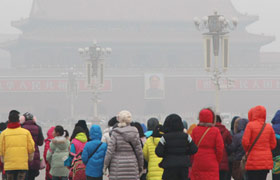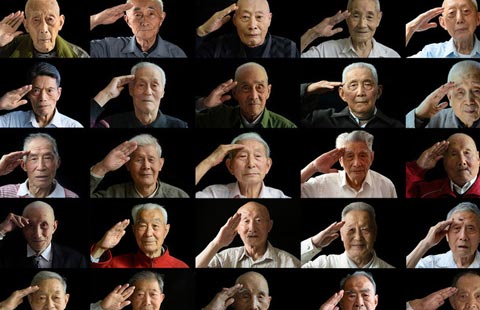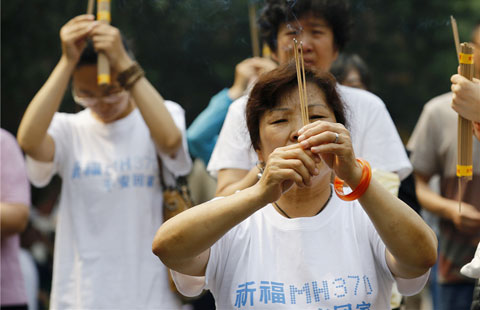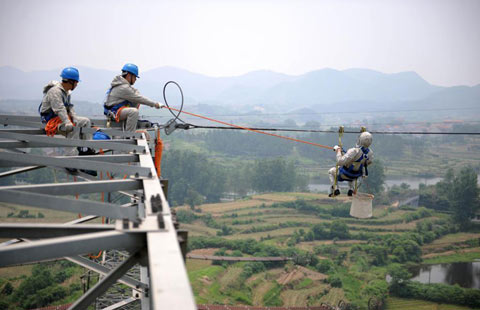Smog descends on the 'two sessions' agendas
By Sun Li in Xiamen, Zhao Ruixue in Jinan, Zhang Xiaomin in Dalian and He Na in Beijing ( China Daily ) Updated: 2014-01-22 09:48:17Protective masks
Ye Zhiyong, an outdoor sports enthusiast from Xiamen, Fujian province, had used the phrase "Let's jog under the warm sun" as a sign-off on QQ, a highly popular instant-messaging service, for years. However, on a December day when the city was stifled by smog so thick that the sun was dimmed, the 27-year-old salesman replaced his optimistic message with just two words, "Damn it".
"I never imagined that Xiamen, a city known for its excellent air quality, would be affected by smog," said Ye, adding that the hazardous environment dampened his enthusiasm for outdoor activities and forced him to buy a protective mask, something he had never considered necessary before.
Fujian was first badly affected by smog in December. A report released by the provincial Environmental Protection Bureau shows that from Dec 28 to Jan 6, only two days were considered "good" in terms of air quality in Fuzhou, while Xiamen recorded six "lightly polluted" days in early January.
| Special: Fight Air Pollution |
Smog used to be rare in Fujian and the purity of its air has always been a proud boast of the coastal province. Many residents regarded the province as a defensive bunker that would shield them from heavy smog. Now, however, they are worried that the bunker has been infiltrated and smog became a hot topic at the province's two sessions.
Pan Liang, a member of the Fujian Committee of CPPCC and an official with the Fujian Committee of the Chinese Peasants' and Workers' Democratic Party, suggested the meteorological and environmental protection agencies should beef up research and ascertain the cause of the filthy air.
"Some meteorological experts explained that the smog was blown from the north to the south, but did it really come that far? Do some of our cities produce the smog themselves, through car emissions and other means," Pan asked. "Only when we know the real reasons will we be able to tackle the issue properly," he said.
Fearing that many local residents feel "immune" to the problem, Pan also urged greater dissemination of information to the public, such as the constituent factors of smog, an early warning system of days when the levels are likely to be high, and the advisability of wearing protective masks.
Chen Xiaowen, an entrepreneur from Xiamen and a deputy at the Fujian Provincial People's Congress, suggested establishing a system to monitor the level of air pollution and provide early warnings.
Chen, who often jogs around Xiamen's ring road, said she has sometimes noticed a strange, yellow hue in the sky above neighboring Zhangzhou. "I know there's a large power station down there, but did it cause the pollution? We don't know because Xiamen's environmental protection bureau is unable to monitor the pollution, only the Zhangzhou bureau can do that," she said. "The fight against smog can never just be the work of one city, though, and combined supervision by several cities should come into force."
Firecracker ban?
 |
| Web crackles with anti-fireworks frenzy |
Located at the southernmost tip of the Liaodong Peninsula, Dalian is bordered by the sea on three sides, and 41.5 percent of the city is covered by forests. Despite attracting nationwide fame for its beauty and clean air, Dalian has also been plagued by heavy smog.
At the annual session of the municipal people's congress, which ran from Jan 7 to 10, the deputies expressed deep concern. Zhou Hong, general manager of a local cleaning company, suggested banning firecrackers in the main urban areas during Spring Festival, which falls at the end of the month.
"Heavy smog has a great impact on industrial production, traffic and people's health. If we had to choose between firecrackers and clean air, I believe most residents would choose the latter," she said.
In the local government's work report, Dalian Mayor Li Wancai said the city will strengthen environmental construction and protection this year; 120 million trees will be planted and coal-fired power plants will be equipped with desulphurization equipment and facilities to clean the air.
|
|
|
|
|
|
|
|



















 Op Rana
Op Rana Berlin Fang
Berlin Fang Zhu Yuan
Zhu Yuan Huang Xiangyang
Huang Xiangyang Chen Weihua
Chen Weihua Liu Shinan
Liu Shinan